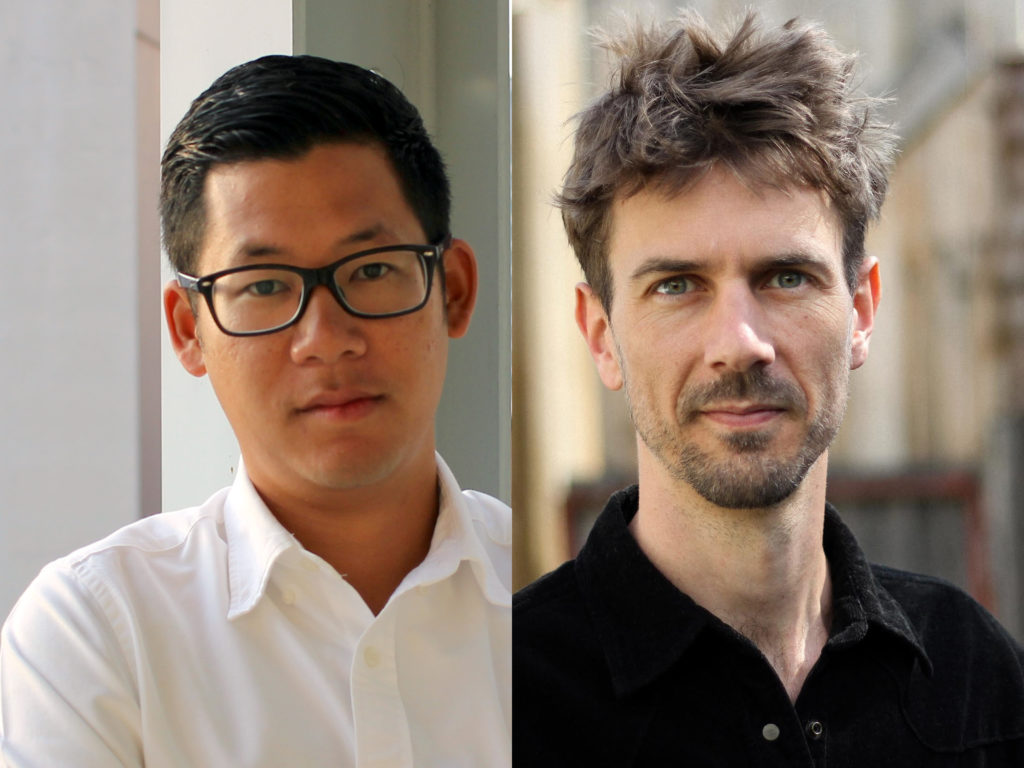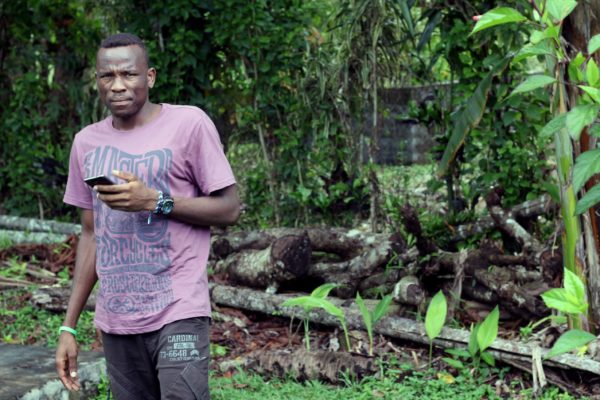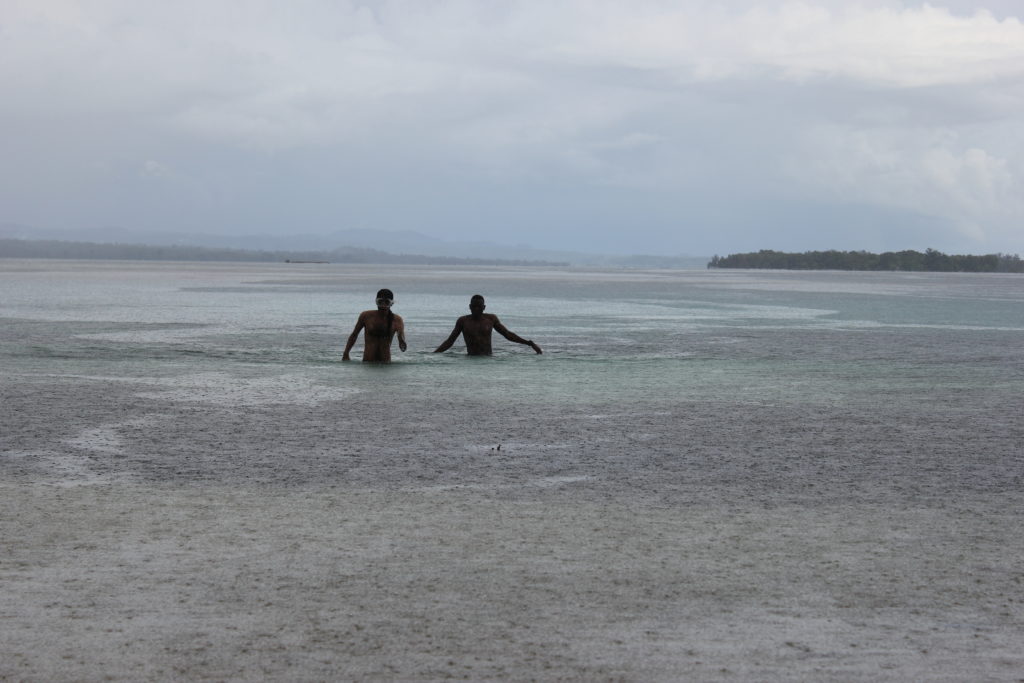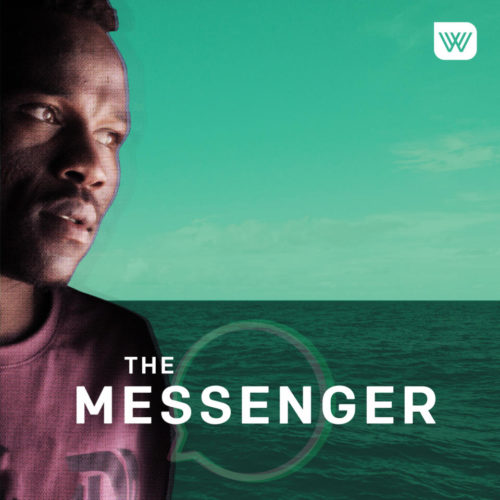Journalist Michael Green and writer André Dao are cofounders of Behind the Wire, an oral history project documenting people’s experience of immigration detention, and producers of The Messenger — a podcast about Abdul Aziz Muhamat and his life inside the Australian-run immigration detention centre on Manus Island.
In this edition of Working with Sound, they discuss translating stories from text to sound – and confess an affection for a good, searchable spreadsheet.

What piece of audio has had the most profound effect on you – as a listener, as an audio maker or both?
André Dao: This probably isn’t quite what you meant, but I recently went back and listened to some recordings I made of my grandfather, talking about the time he spent as a political prisoner in Vietnam. He passed away a couple of years ago, and listening to raw, unedited tape of his voice – interrupted by my grandmother, interjecting from another room – reminded me of why I write, and why I work on projects like The Messenger.
Michael Green: When I first listened to Radio Diaries, it felt like a revelation. I was in awe of the diarists’ honesty, the intimacy of the things they say and the sounds they capture. Like this one, from Juan, who had crossed the Rio Grande illegally to get into Texas. As a journalist, I thought about the extraordinary amount of time and work behind the work – the way the producers must have mentored each person to build their trust and confidence, as well as their recording and reporting skills. I think that way of working is so crucial to the power of the finished audio stories.
Where did the idea for The Messenger come from?
M: The idea came from listening to Aziz’s voice. I first got in touch with him to work on a story for our book, They Cannot Take the Sky (and we did end up making a written story with Aziz). From the first night we exchanged voice messages, I was so captivated by the sound of his voice, and the immediacy and incongruity of hearing him speak from inside detention on Manus Island, that I knew I wanted to make some kind of radio piece, if we could do it.
It’s amazing how a really promising passage of transcript can come across as flat when we listen back, or vice versa
What is your favourite part of making The Messenger?
A: There are a couple of things I really love. First, it’s always a thrill when the audio draft comes back from our audio producers Bec Fary and Jon Tjhia and I get to hear our script come to life for the first time. And then there’s the moment when Michael forwards me a message from Aziz, responding to the latest episode.
M: Aziz and I have spoken so much – we’ve exchanged over 4000 messages since March 2016, and then I visited him on Manus Island. That amount of material is completely overwhelming, but the conversation has meant so much to me. As we write the script, it’s a joy to relive and rediscover things he’s said. It’s also a joy to have my co-writers, André and Hannah Reich, help me sort through it all.
What is the hardest part of producing The Messenger?
M: I worry about what will happen to Aziz. We work really closely with him to make sure we are representing his views accurately, and that he’s happy with each show. But even so, I’ll sleep much better when I know he’s finally found that safe place he’s been searching for.
A: The legal concerns have definitely been something we’ve had to think long and hard about. From a production point of view, one of the biggest challenges is the sheer volume of the content we’re working with, and the fact that inevitably, some really good audio ends up on the cutting room floor.

What’s the best thing about working with sound?
A: I love the sense of intimacy we get from the sound of Aziz’s voice, and the immersive experience of hearing the background sounds in his messages: the pouring rain, the tinny PNG pop music, other men’s voices calling his name. These are all intimacies you can only achieve with sound, I think.
M: As a writer, accustomed to print, I love putting on my headphones and listening to the words come alive. In production, I listen to each episode over and over, and I wonder, ‘Is this working?’ And then, once it’s released, I listen again … and the sound of it just absorbs me in a whole new way.
What’s the best (or worst) advice you’ve received about podcasting?
M: When Hannah Reich joined our team, she brought lots of hilarity and writing smarts, and also a simple but priceless tool – a Google Sheet. If she hadn’t organised our mass of content into a searchable database, I’m not sure we would have made a single episode.
A: The Google Sheet has been incredible! I think the other bit of useful advice was to record everything – you never when that first greeting or bit of atmosphere might be the perfect segue between scenes.
What has been your biggest lesson as a producer so far?
A: I’m still learning how to read a script with audio in mind. It’s amazing how a really promising passage of transcript can come across as flat when we listen back, or vice versa.
M: It takes a heck of a long time to make a well produced audio story! There’s so much required at every step. Work with great people, if you can!
Do you interact with your audience, or receive feedback or criticism about your work?
A: Mostly, people I meet ask me, ‘When’s the next episode coming out?’ I guess it’s part of the danger of making a 10-part narrative series that incorporates current events. But I’m mostly chuffed that people are so eager to hear more!
M: Aziz told me he’s had lots of people contact him through Facebook, and tell him that they’re really moved by the show, and that it made them cry. My first response was, ‘That’s so great!’ Then I asked how he felt about it. He said he feels good, and happy to be telling people what has happened to him. But he also said, ‘It’s hard to have that kind of feeling, especially when you still don’t know your future. You can only keep yourself busy with thinking about how to obtain freedom from this trap.’

Aziz told me he’s had lots of people contact him through Facebook, and tell him that they’re really moved by the show, and that it made them cry
If you could go out to dinner with any audio maker, who would it be – and what would you talk about?
M: We’ve just released the final* episode of The Messenger, and right now I think I could only summon the energy to catch up with Jon Tjhia and Sophie Black from the Wheeler Centre, take a deep breath and order a martini. (* There’ll be an update.)
What are you listening to at the moment?
A: I recently finished Radiolab’s More Perfect series (Season One) about the US Supreme Court. As a lawyer, I was really impressed by the way they brought legal stories to life. It’s something I think we could do with here in Australia – the High Court, and High Court cases, are so important and yet so poorly understood. And there are some great stories buried away in those dusty old law books.
M: For long interviews, cut together as first-person storytelling, I like Everything Is Stories. NPR’s Embedded does great ‘stories behind the news’. I enjoy hearing about writing craft on Longform. And I always like dipping into the New Yorker’s Fiction podcast, for the fiction – and the analysis.
What’s your favourite Australian podcast, and why?
A: I really enjoy SBS True Stories. What’s not to love about hearing some of my favourite writers sharing hilarious, embarrassing and deeply moving stories about themselves? Ellen Van Neerven’s story from Season One is a particular highlight.
M: I’m stuck on RN. Nothing original here I’m afraid, but I’m a big fan of Background Briefing for its depth, and I love the breadth of Earshot and This is About.
What do you think is unique about Australian audio?
A: I’m not sure I’d say it’s necessarily representative of Australian audio – probably nothing is – but I did love RN’s Soundproof. I thought it was bold and experimental in a way that few shows from overseas (that I’ve listened to) have been, which is why it’s such a shame that it was cancelled. Soundproof’s final show, appropriately named ‘Fin.’, is well worth a listen.
M: Hard question. I don’t think I know enough to say, really … other than that Australian audio tells us about Australia, about what is happening in our cities and towns (and offshore detention centres), and that is incredibly important.
What’s next for you as a producer?
M: Together with Bec Fary, we made a whole lot of audio stories for our exhibition at the Immigration Museum in Melbourne, which ran this year up to the beginning of July. I think we’ll have a few more audio stories in the works, based on Behind the Wire’s archive of interviews.
